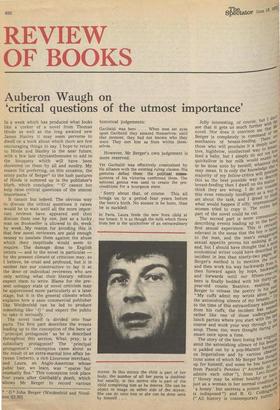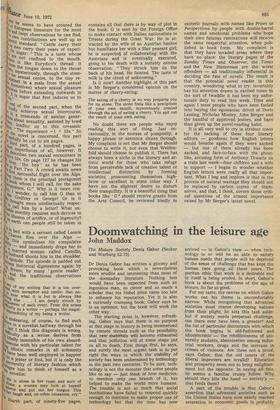Auberon Waugh on
'critical questions of the utmost importance 9 In a week which has produced what looks like a corker of a novel from Thomas Hinde as well as the long awaited new James Hanley it may seem perverse to dwell on a book about which there are few encouraging things to say. I hope-to return to Hinde and Hanley in the near future, with a few late chrysanthemums to add to the bouquets which will have been showered on them by all and sundry. My reason for preferring, on this occasion, the stony paths of Berger.' to the lush pastures of Hinde is summed up in the publisher's blurb, which concludes: "'G' cannot but help raise critical _questions of the utmost importance."
It cannot but indeed. The obvious way to discuss the critical questions it raises would be to wait until all the more important reviews have appeared and then discuss them one by one, just as a lucky man on Bookseller is allowed to do, week by week. My reason for avoiding this is that few novel reviewers are paid enough money to insulate them against the abuse which their ineptitude Would seem to require. The damage done to English letters — and to the novel in particular — by the present climate of criticism may, as I believe, be cruel and profound, but it is neither fair nor constructive to lay it at the door of individual reviewers who are only writing what their literary editors expect them to write. Blame for the present unhappy state of novel criticism may be apportioned more particularly at a later stage, but it is the general climate which explains how a sane commercial publisher like Weidenfeld can be led to produce something like ' G ' and expect the public to take it seriouily.
The novel itself is divided into four parts. The first part describes the events leading up to the conception of the hero or 'principal protagonist' as he is described throughout this section. What, pray, is a subsidiary protagonist? The principal protagonist's' conception came about as the result of an extra-marital love affair between Umberto, a rich Livornese merchant, and Laura, an Anglo-American whose pubic hair, we learn, was "sparse but unusually fine." This conception took place four years after Garibaldi's death, which allows Mr Berger to record various historical judgements: Garibaldi was hero . . . When men set eyes upon Garibaldi they amazed themselves: until that moment, they had not known who they were. They met him as from within themselves.
However, Mr Berger's own judgement is more reserved: Yet Garibaldi was effectively constrained by his alliance with the existing ruling classes. His gestures defied them: the political consequences of his victories confirmed them. The national genius was used to create the preconditions for for a bourgeois state.
Sorry about that, of course. This all brings us to a period four years before the hero's birth. No sooner is he born, than he is suckled: In Paris, Laura feeds the new born child at her breast. It is as though the milk which flows from her is the quicksilver of an extraordinary don't Jolly interesting, of course, but I the see that it gets us much further with tir novel. Nor does it convince me that the _ Berger is completely in command c of ,,re mechanics of breast-feeding. There those who will proclaim it a deePlY sen,st, tive, highbrow, intellectual way to bre1:1-0 feed a baby, but I simply do not see ,,ef quicksilver in her milk would enable majority jboer jtdyonoef umnyto by herself, whatever tnt'la may mean. It is only the knowledge ti1,3,0, this a s the nrocia", fellow-critics will this a s the nrocia", fellow-critics will atte.rLs; this even remotely intelligent as a vist,Y;f1E think they are wrong. I do not conslu'to bestht epnoIssdibwleellweanytbtoe descrioui wsentaaebwouutuldthe b a pt apsekn, and i silly, dread to t"'.ie part women the n novel copy l d it. Tehiumet.Perenstsirie°rIat;t desTchreibi snegcoenvdenptsarlteaidsinmg ourep tcoontvheen first sexual experience. This is cellaiher relevant in the sense that the boy is ".„ted to the man, and the man's exagge—the sexual appetite proves his undoing ar ore end, but I should have thought that a nilie economical writer could have described incident in less than ninety-two Pages.,ent Berger's method is to mention the it, and then work his way backwards fr°"'rds then forward again by hops, bacitWa'nid and forwards until our fifteen-Year',g, hero is finally bedded with his thirtY-slor year-old cousin Beatrice, enabling Id: Berger to release the poetry in his,50ay "My cuffs admit my wrists alone 0,,retin the astonishing silence of my breasts. ,0`5 to the time of this extraordinary adinissl,,d from his cuffs, the incident has seeill'te rather like one of thoseundergraduast lunch parties where you start with the Italie course and work your way through t° soup. These, too, were thought daring smart once upon a time. The story of the hero losing his virgni-ts amid the astonishing silence of his brea,Sue is padded out by a pop-Marxist haratibra. on Imperialism and by various obsef,ht tions some of which Mr Berger has t11°;ir'ed up for himself, and some he has borr°';iot from Pascal's Pensees (" Animals d° admire each other "), from Levi-Stra'ic, (" Honey may be either healthy or is just as a woman in her normal conditiaidle ' a honey' but secretes a poison wherivi-ocl is indisposed ") and R. G. Collirig' (" All history is contemporary hist°rY or June 10, 1972 ti of seems to have scoured the European literature for the most and inept observations he can find, e„ c'wn contributions are well up to 'nniletal standard: "Cattle carry their ',7,111en carry their years of experi va sugar: "'fl is a taste whose neate not confined to the mouth. itross is like Eurydice's thread: it 1.111: the tongue down to the throat
the
to InYsteriously, through the stom,i,,,`"e sexual centre, to the tiny re041stinet in a male from the sexual ,„thethselves) where sexual pleasure 4 ,1Ias before extending outwards in .lifeL,,is sugar that first induces us to e of the second part, when the achieves sexual intercourse, tiolt1 a crescendo of asinine generrnris about sexuality, assisted by lewd leadirtp, up to this orq.asmic tt„: "The experience =1 + life." So '4111'ie novel is concerned, this part fl,8e!ullY be cut to six pages.
part, of a hundred pages, is superfluous of all, however. It ,escribes two sexual encounters in f 8 life. On page 127 he changes his
4ro 4ro
!fl the boy' as he has been Part Two. A crowd awaits news )01;4st sUccessful flight over the Alps. g them is the principal protagonist baok whom I will call, for the sake q't'llierice, G." Why is it more conWonder, to call him G than to Godfrey or George? Or is it ,f . ought more intellectually respechjsteall him by a letter? What unthe'te sterility requires such devices to illusion of artifice, or of ingenuity? P°11 earth can people still be taken in ,.,111 bed with a servant called Leonie A, ‘-ilavez flies over the Alps _ this symbolises his compulsive ,J ----and immediately drops her to te Z /harried woman called Camille, ,ofgusband shoots him in the shoulder. , )4i episode. The episode is padded out 5 olla °as historical digressions again; by i & dream; by many 'gentle reader' 14rld the traditional observations Life: t sa tie Y of my writing that it is too overWith metaphor and simile: that noever what it is but is always like titli;:ig else , . • I am deeply struck by difeeness of each event. From this arises tre:11tY as a writer — perhaps the magniPossibility of my being a writer. e18, endearing, of course, to find such er'e in a novelist halfway through his ' ant I think this diagnosis is wrong. OfieUlty as a writer derives from cl'etally insensible of his own absurdCone with his particular talent for kill idiotic remarks in all solemnity ig ,gave been well employed in happier q `3 a jester or fool, but it is only the rversity of literary fashion which *age8 him to think of himself as a hOvelist: g li e is alone in her room and sure of a woman may look at herself nor and put out her tongue. This 111 Cr laugh and, on other occasions, cry." fourth part, of ninety-five pages, contains all that there is by way of plot in the book. G is sent by the Foreign Office to make contact with Italian nationalists in Trieste during the Great War. He is attracted by the wife of an Austrian banker but humiliates her with a Slav peasant girl; he is suspected of collaborating with the Austrians and is eventually executed, going to his death with a suitably asinine observation: "They struck him on the back of his head. He fainted. The taste of milk is the cloud of unknowing."
Is it now? Another highlight of this part is Mr Berger's considered opinion on the matter of cherry-eating: The eating of a cherry in no way prepares you for its stone. The stone feels like a precipitate of your own mouth, mysteriously created through the act of eating a cherry. You spit out the result of your own eating.
No doubt there are people who enjoy reading this sort of thing. Just occasionally, in the morass of pomposity, a happy phrase or sentence shines through. My complaint is not that Mr Berger should choose to write it, nor even that Weidenfeld should choose to publish it. There has always been a niche in the literary and artistic world for those who take refuge from perceivable lack of creative talent or intellectual distinction by forming societies, pronouncing themselves highbrow or excellent in some other way. I have not the slightest desire to disturb their tranquillity. It is a beautiful thing that books like 'G should receive grants from the Arts Council, be reviewed kindly in esoteric journals with names like Prism or Perspectives by people with double-barrel names and emotional problems who hope their own fatuous ruminations will receive the same respectful attention, when published in book form. My complaint is that they have invaded areas where they have no place: the literary pages of the Sunday Times and Observer, the Times and the New Statesman are the worst offenders — all traditionally influential in deciding the fate of novels. The result is that the potential novel reader in this country, wondering what to try, invariably has his attention drawn in excited tones to the sort of twaddle it has been my unfortunate duty to read this week. Time and again I meet people who have been fooled into buying the egomaniac drivel of Doris Lessing, Nicholas Mosley, John Berger and the handful of approved jesters, and haye thus given up the novel-reading habit.
It is all very well to cry in strident tones for the sacking of these four literary editors — goodness how English letters would breathe again if they were sacked — but one of them already has been sacked, and face-to-face with the ghostlike, accusing form of Anthony Thwaite on a train last week—four children and a wife to support — I began to wonder whether English letters were really all that important. What I beg and implore is that in the process of natural wastage they should not be replaced by carbon copies of themselves, and that, I think, covers those critical questions of the utmost importance raised by Mr Berger's latest novel.









































 Previous page
Previous page